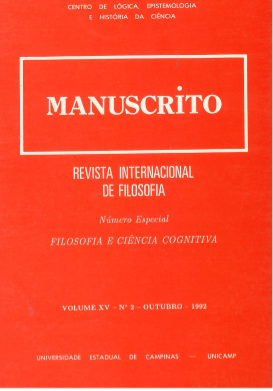Resumo
O objetivo central do artigo é refutar a concepção segundo a qual a Ciência Cognitiva apropria-se dos problemas tradicionais da Epistemologia, condenando-a, assim, ou à extinção ou ao desempenho de um papel essencialmente subalterno.
Referências
Carnap, R. (1934). The Unity of Science. Londres: Kegan Paul. (Tradução de Die Physikalishe als Universalsprache der Wissenschaft. Erkenntnis: 1931-2).
Chomsky, N. (1976). Refletions on Language. Glasgow: Fontana/Collins.
Gardner, H. (1985). The Mind’s New Science: A History of the Cognitive Revolution. New York: Basic Books.
Guthrue, W.K.C. (1950). The Greek Philosophers from Thales to Aristotle, London: Methuen.
Haugeland, J. (1985). Artificial Intelligence: The Very Idea. Cambridge: The MIT Press.
Neurath, O. (1959) Protocol Sentences. In A. Ayer (ed.), Logical Positivism. Glencoe: Free Press. (Tradução de Protokollsatze. Erkenntnis: 1932-3).
Oliveira, M.B. de (1985). The Problem of Induction: A New Approach. British Journal for the Philosophy of Science, 36: 129-145.
Oliveira, M.B. de (1987). Popper on Induction. The Journal of Non-Classical Logic 4(2): 45-71.
Penelhum, P. (1983). God and Skepticism: A study in Skepticism and Fideism. Dordrecht: D. Reidel.
Piatelli-Palmarini, M. (1983). Teorias da Linguagem, Teorias da Aprendizagem. São Paulo: Cultrix/EDUSP.
Popkin, R. (1967). Skepticism. In P. Edwards (ed), The Encyclopedia of Philosophy. Marcmillan e Free Press.
Porchat, O. (1991). Sobre o que Aparece. Revista Latinoamericana de Filosofia XVII(2).
Quine, W.V.O. (1980). Epistemologia Naturalizada. In Ryle, Strawson, Austin, Quine. Coleção Os Pensadores. São Paulo: Abril Cultural.
Russel, B. (1950). An Inquiry into Meaning and Truth. London: Allen & Unwin.
Russel, B. (1961). History of Western Philosophy. London: Allen & Unwin.

Este trabalho está licenciado sob uma licença Creative Commons Attribution 4.0 International License.
Copyright (c) 1992 Manuscrito: Revista Internacional de Filosofia


